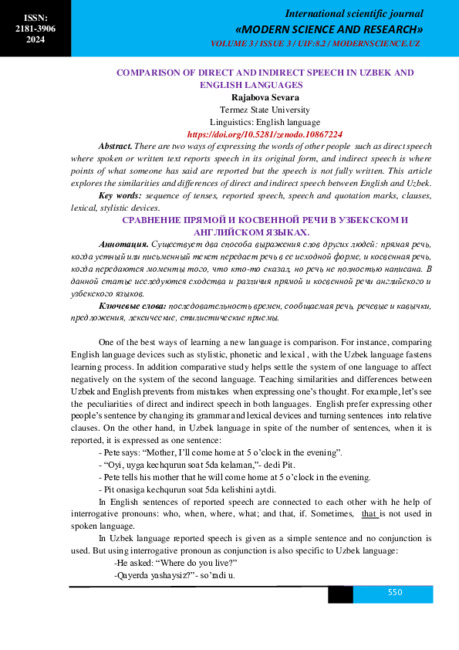
ISSN:
2181-3906
2024
International scientific journal
«MODERN SCIENCE АND RESEARCH»
VOLUME 3 / ISSUE 3 / UIF:8.2 / MODERNSCIENCE.UZ
550
COMPARISON OF DIRECT AND INDIRECT SPEECH IN UZBEK AND
ENGLISH LANGUAGES
Rajabova Sevara
Termez State University
Linguistics: English language
https://doi.org/10.5281/zenodo.10867224
Abstract.
There are two ways of expressing the words of other people such as direct speech
where spoken or written text reports speech in its original form, and indirect speech is where
points of what someone has said are reported but the speech is not fully written. This article
explores the similarities and differences of direct and indirect speech between English and Uzbek.
Key words:
sequence of tenses, reported speech, speech and quotation marks, clauses,
lexical, stylistic devices.
СРАВНЕНИЕ ПРЯМОЙ И КОСВЕННОЙ РЕЧИ В УЗБЕКСКОМ И
АНГЛИЙСКОМ ЯЗЫКАХ.
Аннотация.
Существует два способа выражения слов других людей: прямая речь,
когда устный или письменный текст передает речь в ее исходной форме, и косвенная речь,
когда передаются моменты того, что кто-то сказал, но речь не полностью написана. В
данной статье исследуются сходства и различия прямой и косвенной речи английского и
узбекского языков.
Ключевые слова:
последовательность времен, сообщаемая речь, речевые и кавычки,
предложения, лексические, стилистические приемы.
One of the best ways of learning a new language is comparison. For instance, comparing
English language devices such as stylistic, phonetic and lexical , with the Uzbek language fastens
learning process. In addition comparative study helps settle the system of one language to affect
negatively on the system of the second language.
Teaching similarities and differences between
Uzbek and English prevents from mistakes when expressing one’s thought. For example, let’s see
the peculiarities of direct and indirect speech in both languages. English prefer expressing other
people’s sentence by changing its grammar and lexical devices and turning sentences into relative
clauses. On the other hand, in Uzbek language in spite of the number of sentences, when it is
reported, it is expressed as one sentence:
- Pete says: “Mother, I’ll come home at 5 o’clock in the evening”.
- “Oyi, uyga kechqurun soat 5da kelaman,”- dedi Pit.
- Pete tells his mother that he will come home at 5 o’clock in the evening.
- Pit onasiga kechqurun soat 5da kelishini aytdi.
In English sentences of reported speech are connected to each other with he help of
interrogative pronouns: who, when, where, what; and that, if. Sometimes, that is not used in
spoken language.
In Uzbek language reported speech is given as a simple sentence and no conjunction is
used. But using interrogative pronoun as conjunction is also specific to Uzbek language:
-He asked: “Where do you live?”
-Qayerda yashaysiz?”- so’radi u.

ISSN:
2181-3906
2024
International scientific journal
«MODERN SCIENCE АND RESEARCH»
VOLUME 3 / ISSUE 3 / UIF:8.2 / MODERNSCIENCE.UZ
551
-He asked me where I lived.
-U mendan qayerda yashashimni so’radi.
In English reported speech comes after the speech of author. In Uzbek we can see the
opposite of this rule.
Nick
said
he was worried.
Nik havotirlanayotganini
aytdi
.
In English when subject of direct speech is 1
st
or 2
nd
person, and subject of author’s speech
is 3
rd
person, in reported speech it changes to 1
st
->3nd person; 2
nd
-> 1
st
or 3
rd
person.
Normally, the tense in reported speech is one tense back in time from the tense in direct
speech
He said: “ I like salad”. – He said he liked salad.
“Men salatni yaxshi ko’raman ,”-dedi u. – U salatni yaxshi ko’rishini aytdi.
He said : “I have been to London”. – He said that he had been to London.
Sequence of tenses is not occurred in Uzbek. That’s why learners may face with
interference between languages during the learning process. In Uzbek the difference between the
verb of direct and indirect speech is not connected to tenses.
Uzbek students also face difficulties when using auxiliary verbs in direct and indirect
speech as they are limited with ony adding suffixes to noun
-She said that she
had
seen that film.
-U bu filmni ko’r
ganligini
aytdi.
-She said that she
would
see her there.
-U uni o’sha yerda ko’r
ishligini
aytdi.
It is important to note that nowadays most of the essays prefer to use direct speech rather
than indirect speech. Because in direct speech author keeps all the features of the sentence and
expresses someone’s thought more clear and effectively. Direct speech especially comes in handy
when expressing character’s inner feeling.
But in spoken language reported speech is mostly preferred
That’s why, learners should learn differences mentioned above carefully in order to give
clear view of their thought to somediv.
REFERENCES
1.Е.Ворно, Д Федосеева.Reported speech in English.- Ленинград ,1971.-pg 8.
2.M.Sharipov. O’zbek tilida ko’chirma va o’zlashtirma gap.- Toshkent, 1995.-pg 20.
3. www.wikipedia.com





